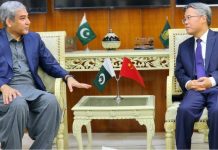Author: Banadi Baloch
In today’s digital age, the control over the narrative of events has become a pivotal battleground. Information blackouts and the manipulation of digital spheres are modern tools of conflict. This is especially evident in the context of Balochistan, where the Baloch people’s struggle for autonomy and rights faces significant obstacles from the Pakistani state. Pakistan’s control over the telecommunications sector and its ability to influence digital development pose a direct threat to digital openness of Baloch and freedom of expression.
The digital sphere represents a new terrain of conflict where the presence of Baloch asserts itself as a fundamental right. The Baloch narrative, seeking to expose the truth of their oppression and struggles often conflicts with the dominant Pakistani narrative, which aims to suppress dissent and maintain control. Pakistan’s efforts to block the Baloch narrative involve a systematic approach to censor, silence, and manipulate information. Despite these efforts, the resilience of the presence of Baloch in digital sphere continues to challenge this hegemony.
The Pakistani state’s attempts to maintain its narrative and suppress the Baloch perspective have not gone unchallenged. The inherent difficulty of censoring the vast and interconnected digital world means that numerous cracks have appeared on the digital wall-built to contain the Baloch narrative. The Baloch people leverage these gaps to disseminate their stories, experiences and truths. Unlike the state’s resource-intensive efforts to suppress dissent, the Baloch rely on the simplicity and power of truth, which needs no elaborate mechanisms to convey itself.
The power of the Baloch digital narrative lies in its simplicity and authenticity. While suppressing the truth requires extensive resources including financial investment, lobbying, and constant vigilance; the truth itself is straightforward and compelling. This fundamental disparity underscores the sustainability of the Balochâs presence in digital world . The Baloch community’s commitment to share their reality does not demand the same level of effort as the state’s attempts to obscure it. Thus, the truth’s natural resilience continues to assert itself in the digital sphere.
Despite the digital breakthroughs, Baloch influencers face severe repression. The Pakistani state strictly prohibits any discussion related to oppression, war, prison conditions, missing persons, and the general suffering of the Baloch people. Those who dare to voice undesired opinions are met with harsh consequences, including arrest, abuse, and assault. This systematic silencing underscores the lengths to which the state will go to maintain its narrative and suppress dissent.
The struggle for control over the narrative in Balochistan exemplifies the broader conflict between state power and individual truth in the digital age. The presence of Baloch in digital field, though under constant threat, continues to challenge Pakistani hegemony by leveraging the inherent power of truth. The state’s repressive measures highlight its fear of losing control over the narrative, while the Baloch people’s resilience and commitment to their cause underscore the enduring power of truth in the face of oppression. As long as there are cracks in the digital wall, the Baloch narrative will continue to find ways to be heard, challenging the state’s attempts to silence it and seeking justice for their community.
Disclaimer: The views and opinions expressed in this article are those of the author and do not necessarily reflect the official policy or position of The Balochistan Post or any of its editors.






























